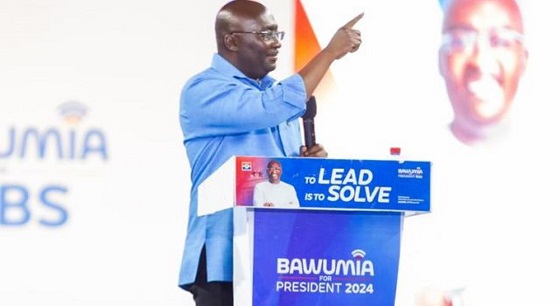Vice President and Presidential candidate of the New Patriotic Party (NPP) in the 2024 general election, Dr. Mahamudu Bawumia has outlined an elaborate plan to create about 4 million jobs in the country in the next eight years of his administration.
He pointed out that some 2.6 million jobs were created under NPP government from 2017 to 2024 and yet there was more to be done to reduce unemployment in Ghana.
He said out of the number, 1.4 million jobs were created by the private sector while government created 1.2 million.
Speaking yesterday in Accra on the programme, ‘Jobs for the Youth,’ Dr. Bawumia said his administration has far-reaching policies and programmes that will drive and create the needed decent employment opportunities.
He said the NPP government, recognizing and understanding that there are conditions that create sustainable and decent jobs has implemented numerous policies to this effect.
Areas to create job opportunities, according Dr. Bawumia, are industrialisation, education and health sectors and the private sector, which his government will strongly support.
He promised to train about 1 million youth in ICT for them to take advantage of the fourth industrial revolution to acquire sustainable jobs for themselves.
72,000 Jobs under Agenda 111
Dr. Bawumia said his government will complete all Agenda 111 hospitals that have started by the current Akufo-Addo/Bawumia administration to create some 72,000 jobs in the country.
Other areas to create jobs will be the support of the growth of businesses including the following:
a) Use Government’s purchasing power to stimulate industrial expansion and business growth, which will help create jobs, by rolling out a “Buy Ghana First” policy under which all goods and services procured by the public sector will first be filled by goods and services produced locally.
b) Establish an SME Bank to meet the special financing needs of small and medium businesses, which employ over 80% of Ghanaians
c) Incentivise Ghanaian start-ups in selected, strategic sectors with Investment Tax Credits (ITC) for the first three (3) years of their operations
d) Implement a shift in electricity tariffs structure to a regime in which commercial rates are either equal to, or lower than residential rates, never higher, to power industries and businesses
e) Reduce the cost of power by bringing on board 2,000 MW of solar power, and incentivising users by buying excess power they generate from solar systems and paying with “free electricity” from the national grid when they need power (through net metering)
f) Special Economic Zones (Free Zones) will also be created in collaboration with the private sector at Ghana’s major border towns such as Aflao, Paga, Elubo, Sankasi and Tatale to enhance economic activity, increase exports, reduce smuggling and create jobs.
Free SHS policy
Dr Bawumia said the Free SHS Policy, with about 3 million beneficiaries is one of the critical policies to lay the foundation for decent and sustainable jobs.
“Expansion of second-cycle education with the Free SHS Policy enhances the skills of all beneficiaries who some, hitherto might have fallen off the education ladder due to financial challenges.
“Technical and Vocational Education Training (TVET) has not also been left out,” he added.
Dr. Bawumia said there is a need to train Ghana’s labour force with the right skills needed to drive industrialization.
Accordingly, the Akufo-Addo-led administration in the last eight years has undertaken massive investment in TVET including Science Technology Engineering and Mathematics (STEM).
“The vision is to prepare the country’s emerging labour force with the right training, skills, and education for the 4th Industrial Revolution. More so, this is also to address the mismatch between the skills of the labour force and the demands of the industry,” Dr. Bawumia reiterated.





